Turkey amends its KKDIK regulation
Date: 4 December 2019
On 29 November 2019, the Turkish authorities published the Regulation No 30963 amending KKDIK, its chemicals regulation. The amendments involve: - Additional definitions in Article 4
- A new entry to Annex-17 restricted substance list
- Introduction of a new sub-annex, Annex-XI, to Annex 17
Introduction of OR function under K-BPR
Date: 29 November 2019
Under K-BPR law, there is no function of Only Representative (OR) until now. This leads non-Korean companies, which have no branch office in Korea, to give all the information requested by authorities to their importers for notifying their active substances.
According to recent information from NIER (National Institute of Environmental Research), the OR concept will soon be extended to K-BPR under Korean civil law. This means that foreign companies can appoint consulting companies with a business registration certificate in Korea as their OR, not only for K-REACH but also for K-BPR.
No English translation for K-BPR
Date: 28 November 2019
According to recent information from NIER (National Institute of Environmental Research), the Korean government has no intention to publish the K-BPR law in English. If you have any questions about K-BPR law (including the sub laws), please This email address is being protected from spambots. You need JavaScript enabled to view it..
Second Corrigendum of MDR (EU) 2017/745: Will class 1 devices get an extension?
Date: 27 November 2019
On 25 November 2019, the Council of the European Union published a second corrigendum to MDR (EU) 2017/745. The corrigendum includes overall 12 edits, corrections or additions, changing Article 78, 84, 88, 120, 122 and Annex I and III.
The most significant change affects class I medical devices, for which the conformity assessment procedure requires the involvement of a notified body. Such devices, for which the declaration of conformity was drawn up prior to 26 May 2020, could be placed on the market or put into service until 26 May 2024. This addition is suggested to Article 120 paragraph (3), which was previously only related to devices that already had been certified by notified bodies. In addition, Article 120 paragraph (4) should be modified to include all products related to paragraph (3). This second change would effectively allow these devices to be made available on the market and put into service until 26 May 2025. The change applies to class I devices, which are sterile, include a measuring function, or are reusable surgical instruments.
Start action to prepare your joint submission under K-REACH
Date: 26 November 2019
The Korean Environment Corporation informed SCC that the companies that have already joined consortia do not need to wait for further potential members. They should start internal communication with other members to prepare the registration of 1000 tonnage under K-REACH.
In order to prepare a joint submission, consortium members have to decide on the Lead Registrant (LR). Potential candidates for LR should inform to other consortia members of their intentions, voting date and its duration at least 3 days before the LR election. When all the members have agreed on the election, the potential LR needs to activate a voting function on the CICO website for the respective consortia. Once it is opened, the consortia member can vote.
For the substances in the nanoforms, it is recommended to set up a separate nanomaterial* consortium, even though nanomaterials might have the same CAS number as the equivalent materials without nanoscale features. The MoE (Ministry of Environment) recommends producers and importers of nanomaterials to join the nanomaterial consortia on the CICO webpage. (See our news on CICO dated 11 Oct. 2019)
*According to the paragraph 7 article 2 of presidential decree of K-REACH, nanomaterials are described as:
- 50 % or more of the particles in the number size distribution, one or more external dimensions is in the size range 1 nm-100 nm, or
- fullerenes, graphene flakes and single wall carbon nanotubes with one or more external dimensions below 1 nm.
If you need any help with K-REACH or consortia management in Korea, please This email address is being protected from spambots. You need JavaScript enabled to view it..
List of notified existing active substances under K-BPR is now released
Date: 21 November 2019
On 18 November, the Korean government published the list of notified existing active substances. The list contains the names of the notified active substances, their CAS numbers, their deadlines and the notifiers. Through this list, you can learn whether your notification was successful. If you cannot find your company’s name under the substances which you notified, there is still the possibility to send a corresponding note to the Legislation supporting center or the MoE (Ministry of Environment) by 5 December.
Even if you missed the notification deadline of 30 June 2019, this means if you have not notified at all, you still have the possibility to submit a notification by 11 December 2019. The final version of the list will be released after that.
From 1 January 2020, the active substances have to get approval before being produced in or exported to Korea, unless they have been successfully notified so that the grace period applies. Therefore, don’t miss the last chance to notify your active substances in order to use the advantage of the grace period.
You can find the mentioned list here. Please note, however, that the information on the list is written in Korean. Nevertheless, you will be able to find the name of your notified active substance (in English) and its CAS number.
For further questions, please feel free to contact our South Korea expert This email address is being protected from spambots. You need JavaScript enabled to view it..
India to Include Biostimulants into the Fertiliser Act 1985
Date: 8 November 2019
The Indian government intends to include biostimulants into the Fertiliser (Control) Order, 1985. For this reason, it has recently issued a draft guideline on biostimulants, making it available to public consultation. The guideline defines biostimulants as “compounds, substances and products including microorganisms whose functions when applied to plants/seeds/ rhizosphere is to regulate and enhance a crops physiological processes independent of the products nutrient contents to improve input use efficiency, growth, yield, quality and/or stress tolerance. The bio stimulants may include products of plants /animals or microbial origin”.
UBA requests Supreme Court review of judgments on pesticides
Date: 25 October 2019
On 10 September 2019, we already published an article on our website concerning the Judgment of the Administrative Court of Braunschweig on admissibility of biodiversity areas. To view the article, click here.
Now the UBA commented on 21 October 2019 (Press release by UBA - Nr. 38/2019), on the judgments of the Administrative Court in Braunschweig regarding the temporary approval of plant protection products.
At the end of last year and at the beginning of this year, the BVL approved several plant protection products and limited these approvals until 31 December of this year. The limitation was based on disputed application restrictions for the protection of the biodiversity of the UBA in its comments on the evaluation of plant protection products.
The Federal Environmental Agency (UBA) states in their recent release that, three recent judgments of the Administrative Court of Braunschweig deny German authorities the right to fully assess the real impact of pesticides on the environment and to prescribe protective measures. UBA considers it imperative that the competent authority (BVL) file an appeal against the judgments.
Maria Krautzberger, President of UBA states:
„Should the judgments of the Administrative Court in Braunschweig become final, we will cease the protection of biological diversity in the authorisation procedure of plant protection products….
It is therefore essential that these legal issues be resolved by the Higher Administrative Court in Lüneburg.”
Click here to view the UBA newsletter in German.
The current state of biopesticide and fertiliser regulation in the EU
Date: 14 October 2019
In the interview for the 2019 Biologicals Special, Dr Lars Huber, Head of Biorationals, Fertilisers & IPM, speaks about the recent developments in the biopesticide and fertiliser markets and the effects they have on the industry. He also touches upon the current problems and identifies main sticking points which need further improvement. He provides advice and offers an outlook for possible future shifts. To read the article, please follow the link.
Dr Lars Huber, Head of Biorationals, Fertilisers & IPMK-REACH: Time to Join the Consortia
Date: 11 October 2019
CICO (Chemical substance Information Communicative Organizations) is opened since 07.10.2019 on K-REACH portal. Future registrants are encouraged by MoE (Ministry of Environment) to join their relevant consortia still within this year and to indicate whether they want to be an active member or rather to be a volunteer as LR (Lead Registrant). The webpage is all written in Korean. Attached you will find the guidance for using the Korean CICO.
If you need further information on the procedure, please contact us.
Call for candidates to enter the EC medical device expert panels
Date: 8 October 2019
Currently, medical device companies fail short to fully implement the MDR (EU) 2017/745 due to several open decisions, missing common standards and guidance documents. However during September this year, some new information about the expert panels has become available.
According to Article 54, the expert panels must be consulted for assessment of the clinical evaluation reports for certain class III and class IIb devices. In addition, the expert panels are also assigned to contribute to the development and maintenance of the common standards (CS), international standards as well as guidance documents, e.g. for clinical evaluations. They will also provide opinions in response to inquiries by manufacturers according to Article 61(2) and offer advice to notified bodies and member states.
With respect to in vitro diagnostic medical devices, the expert groups should also be consulted in cases where no CS are available for class D devices and where it is also the first certification for that type of device.
New Head of Agrochemicals and Biorationals at SCC from 1 October 2019
Date: 1 October 2019
We are glad to announce to you that Dr Bernd Brielbeck will succeed Dr Albrecht Heidemann as the Head of the “Agrochemicals & Biorationals” Business Unit from 1 October 2019.

Dr Heidemann has filled this responsible position since joining the SCC in 1994. He will retire on 1 October 2019, after which Dr Brielbeck will follow him as Head of Business Unit to ensure the continuity and continued competence you expect from SCC.
Dr Brielbeck has been in the company since 2001 and has been working in the Business Unit of Dr Heidemann ever since he started, filling the responsible position of Group Leader for the Regulatory Group. Dr Brielbeck is well versed in the particularities of regulatory affairs of plant protection products. To many of you, he is personally known through meetings or presentations on the various aspects of plant protection regulatory affairs.
We are certain that Dr Brielbeck has accumulated all the necessary and detailed experience to fill his new responsible position. We are very happy that we were able to fill this position with an experienced SCC staff member, who has the necessary intimate knowing of the needs of our clients and the regulatory field that Dr Brielbeck has worked on for so many years already.
We thank Dr Heidemann for his services and wish him all the best for his future endeavours in his retirement.
Judgment of the Administrative Court of Braunschweig on admissibility of biodiversity areas
Date: 10 September 2019
The BVL has recently published the judgment of the Administrative Court of Braunschweig on the admissibility of biodiversity areas:
"The Administrative Court of Braunschweig allowed the claim of two pesticide manufacturers on September 4. The manufacturers had complained that their pesticides were only approved by the Federal Office of Consumer Protection and Food Safety (BVL) until 31 December 2019.
Normally, the BVL sets the duration of the authorisation to be valid for the duration of the approval of the active substance plus one year. The reason for the shortened expiry date for the authorisation in the two cases mentioned above were the controversial application requirements for biodiversity protection required by the Federal Environmental Agency (UBA) from 2020 onwards.
The judgments now oblige the BVL to grant authorisations for the mentioned plant protection products beyond the previous expiry date of the registration on 31 December 2019.
Furthermore, according to the judgments, the approval must be extended with its current content and not be provided with the application provisions for biodiversity requested by the Federal Environmental Agency.
The Administrative Court justifies this decision by stating that it is currently not possible to take into account unacceptable effects on biodiversity, as there is a lack of scientific methods approved by the European Food Safety Authority (EFSA) for assessing these effects. Also, neither Regulation (EC) No 1107/2009 nor the Plant Protection Act would provide a legal basis for the adoption of compensation areas.”
To read the original publication in German, please follow the link to the BVL website.
Efficacy claims against snails in Germany only to be made against real problem organisms
Date: 29 August 2019
In the last year´s applicants of molluscicidal products in Germany repeatedly applied for use against different snail species and not only the well-known problem slug species from the genera Arion and Deroceras. The evaluating Julius Kühn-Institute (JKI) speculates that the efficacy claims against these snail species could have been made to serve as unique selling points for a better commercialization of the products. In the JKI “Journal of cultivated plants” (ISSN 1867-0911, DOI:10.5073/JFK.2019.06.05) Jörn Lemhus, efficacy evaluator for field crops at JKI, published an article “Nicht jede Schnecke verursacht Schäden! (Not every snail causes damage!)" in which he presents the position of JKI as summarized in the following.
Legal assessment claims German UBA´s biodiversity use restrictions (Biodiversitätsflächenauflagen) to be without legal basis
Date: 27 August 2019
In November 2018, German UBA started to give consent to some herbicide and insecticide applications under the precondition that the farmer using that pesticide runs at least 10% of his arable land as so called biodiversity area: fallow land, flower strips or sparse seed, areas on which no pesticide applications may be made. The biodiversity use restrictions are based on a legal assessment that had been issued on behalf of UBA in 2017 (UBA Texte 101/2017). At present several law cases against the biodiversity use restrictions are pending at the administrative court in Braunschweig. Depending on the outcome of these law cases, the provisions of UBA may have to be followed after 1 January 2020.
Now the summary of an extensive legal assessment, originally written on behalf of a pesticide producer: „Biodiversitätsflächenauflagen im pflanzenschutzrechtlichen Zulassungsverfahren – Eine initiative ohne Rechtsgrundlage” (Biodiversity use restrictions in pesticide registration procedures – An initiative without legal basis) was published by Hans-Georg Kamann in Zeitschrift für Stoffrecht (StoffR 2/2019).
Plant biostimulants under the new EU Fertiliser Product Regulation
Date: 1 August 2019
The new Fertiliser Product Regulation (FPR) 2019/1009 was published on 15 June 2019 and will fully apply from 16 July 2022. It defines plant biostimulants1 as products “stimulating plant nutrition processes independently of the product’s nutrient content with the sole aim of improving one or more of the following characteristics of the plant or the plant rhizosphere:
(a) nutrient use efficiency;
(b) tolerance to abiotic stress;
(c) quality traits;
(d) availability of confined nutrients in soil or rhizosphere”.
1 Article 47 of Regulation 2019/1009 amending Article 3 of Regulation 1107/2009
New EU Fertilising Products Regulation (FPR)
Date: 28 June 2019
The new EU regulation on the framework for the bringing onto the market of organic and inorganic fertilisers, liming materials, soil improvers, growing media, inhibitors and biostimulants, the Fertilising Products Regulation (FPR) 2019/1009, was published in the Official Journal of the EU on 25 June 2019. FPR establishes a completely new, harmonised framework which will allow for bringing onto the market not only inorganic fertilisers, as the previous Regulation 2003/2003, but also organic fertiliser products and biostimulants. After many years of discussions and negotiations, EU now has a legally binding definition for biostimulants available, i.e. “plant biostimulant means a product stimulating plant nutrition processes independently of the product’s nutrient content with the sole aim of improving one or more of the following characteristics of the plant or the plant rhizosphere: (a) nutrient use efficiency; (b) tolerance to abiotic stress; (c) quality traits; (d) availability of confined nutrients in soil or rhizosphere.”
Based on this definition, respective amendments to Regulation 1107/2009 are also already established to distinguish between biostimulant and plant protection uses. If this regulatory approach will be sufficient for the many borderline cases between abiotic and biotic plant stress especially for biological substances remains to be seen.
The FPR will enter into force on 15 July 2019 and shall fully apply from 16 July 2022.
Germany decides on MR applications from UK if filed before Brexit
Date: 27 June 2019
On 26 June, the German Federal Office of Consumer Protection and Food Safety (BVL) published an important revision of an earlier German position concerning processing of applications after the Brexit. Mutual recognition applications filed in Germany before the date of the UK's exit from the EU will be processed and decided in Germany even after the Brexit. This change of policy is the result of several expedited proceedings at the administrative court in Brunswick (Az 9B 23/19, not published). The court kept explicitly open if this legal position will also be valid for MR applications filed after the date of the UK leaving the EU. Click here to read the official BVL's note in German.
The MDR implementation is going forward
Date: 27 June 2019
The European Commission (EC) has recently issued some announcements opening the way for the implementation of the medical device regulation (MDR).
One of the most prominent bottlenecks, however, is the designation of the notified bodies. After the BSI nomination in January this year, the TÜV Süd Product Service became the second institution authorised to provide certification services under the new regulation this May. With further 37 notified bodies still awaiting MDR designation, this step cannot count as a big breakthrough. Yet, this designation is not just a formal sign to show that the MDR implementation is moving forward, taking into account the fact that TÜV SÜD is a strong player in Germany with a powerful international presence and openness for new customers.
Join SCC at Chemspec Europe 2019
Date: 26 June 2019
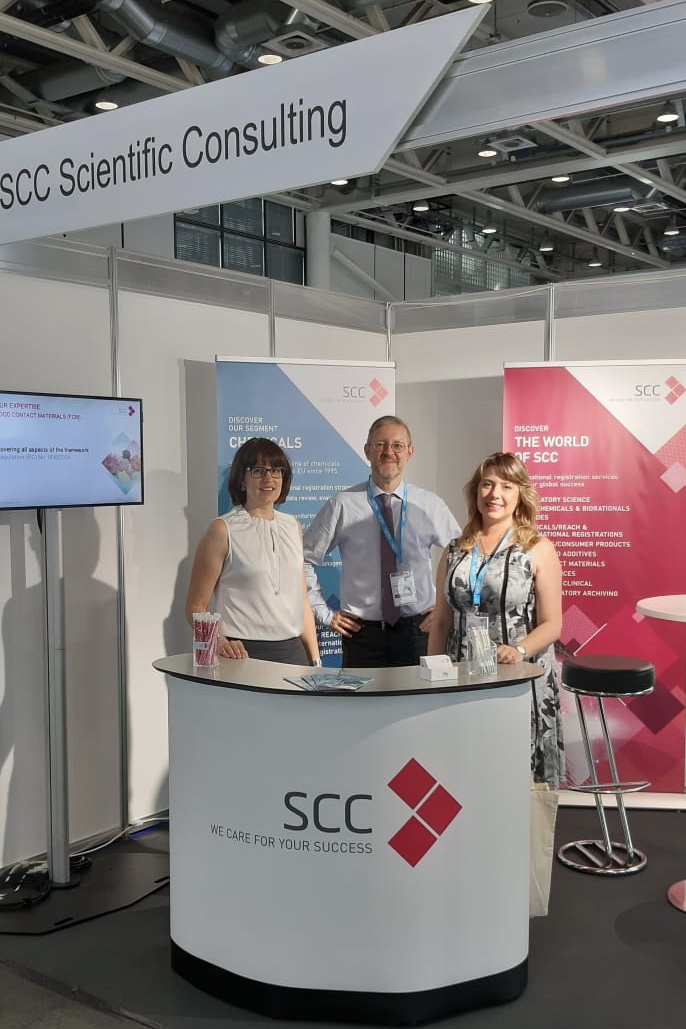
Drop by at SCC's Booth RS / F170
Take the opportunity and visit SCC’s booth RS/F170 at Chemspec Europe 2019 and talk to our colleagues on site about any regulatory or scientific topic of your concern.
Interested in international chemical markets? – Then don’t miss out on SCC’s update on chemicals regulations in South Korea, Turkey and Argentina at the Regulatory Services Lecture Theatre on Day 2 at 13:30.
Europe’s political and legislative framework on pesticides – slow move towards sustainability
Date: 24 June 2019
Regulations within the EU have focused on chemical pesticides and the move towards sustainable and low-risk solutions has been at a slow pace. Dr Lars Huber, SCC's Head of Biorationals, Fertilisers and IPM, traces in his article for Agrow's Biologicals 2019 the evolution of EU regulations and the gradual move towards sustainability. Read the articleCRD issues new efficacy guideline for UK pests in cereals and maize
Date: 5 June 2019
CRD Efficacy is developing a series of crop specific guidelines, including information on agronomy, relevant UK pests and how to support UK authorisations and label claims. In this context CRD has revised the Efficacy guidelines 405 (Data Requirements for oilseed rape and Brassica Pests, Diseases and Weed) and 406 (Data Requirements for Turf Fungicides, Herbicides, Insecticides and plant Growth Regulators) and issued a new guideline: “Efficy Guideline 407: UK Pests of Cereals and Maize, including number of fully supportive trials required to demonstrate effectiveness”. Whereas in the revised guidelines the reclassification of some pests concerning their importance (major and minor) is of most interest, the new guidance for cereals and maize provides useful additional information for applicants of plant protection products in the UK. It is very useful that in the new guidance documents the pest species now are also presented with their EPPO codes and scientific names.
If you need assistance when planning trial programs for conventional products or biopesticides in the UK, please contact This email address is being protected from spambots. You need JavaScript enabled to view it., head of the efficacy group at SCC.New efficacy working document summarising UK major pests, diseases and weeds
Date: 5 June 2019
The first version of the working document “CRD Efficacy Working Document Summarising UK Major ‘Pests’ (Diseases, Pests and Weeds) on a Range of UK Crops“ provides a summary of the range of ‘major’ UK insect pests, diseases, slugs and weeds for the following crops: sugar beet, onion and leek, carrot, grassland, pea, field bean, strawberry, apple and pear. It also gives some indication of the required number of fully supportive effectiveness trials (whereas crop safety is not specifically addressed). This working document is part of a series of crop specific guidance under development, or already available to be used in trial planning, providing reasoned cases for the relevance of data in supporting UK uses and drafting appropriate UK labels.If you need assistance when planning trial programs for conventional products or biopesticides in the UK, please contact This email address is being protected from spambots. You need JavaScript enabled to view it., head of the efficacy group at SCC.
New CRD Efficacy Crop Guide: Potato
Date: 5 June 2019
The new guide on the “Interpretation of efficacy data requirements for the authorisation of a plant protection product in potato (SOLTU) in the UK” helps applicants in interpreting current efficacy data requirements and relevant EPPO standards. It also provides information on UK agronomy, relevant UK targets and trial numbers, if seeking for a UK-only authorisation of outdoor applied products in potato. Post-harvest treatments are not covered.
The document contains UK specific details on potato production, such as information concerning planting and harvesting timings and crop rotation. Furthermore, it provides valuable information regarding the potato market, planted areas and varieties in the UK. Very useful is also the detailed description of major and minor UK pests (insects, nematodes, slugs), diseases and weeds, the number of required trials and extrapolation principles.
Meet SCC at MedtecLIVE 2019 in Nuremberg
Date: 21 May 2019
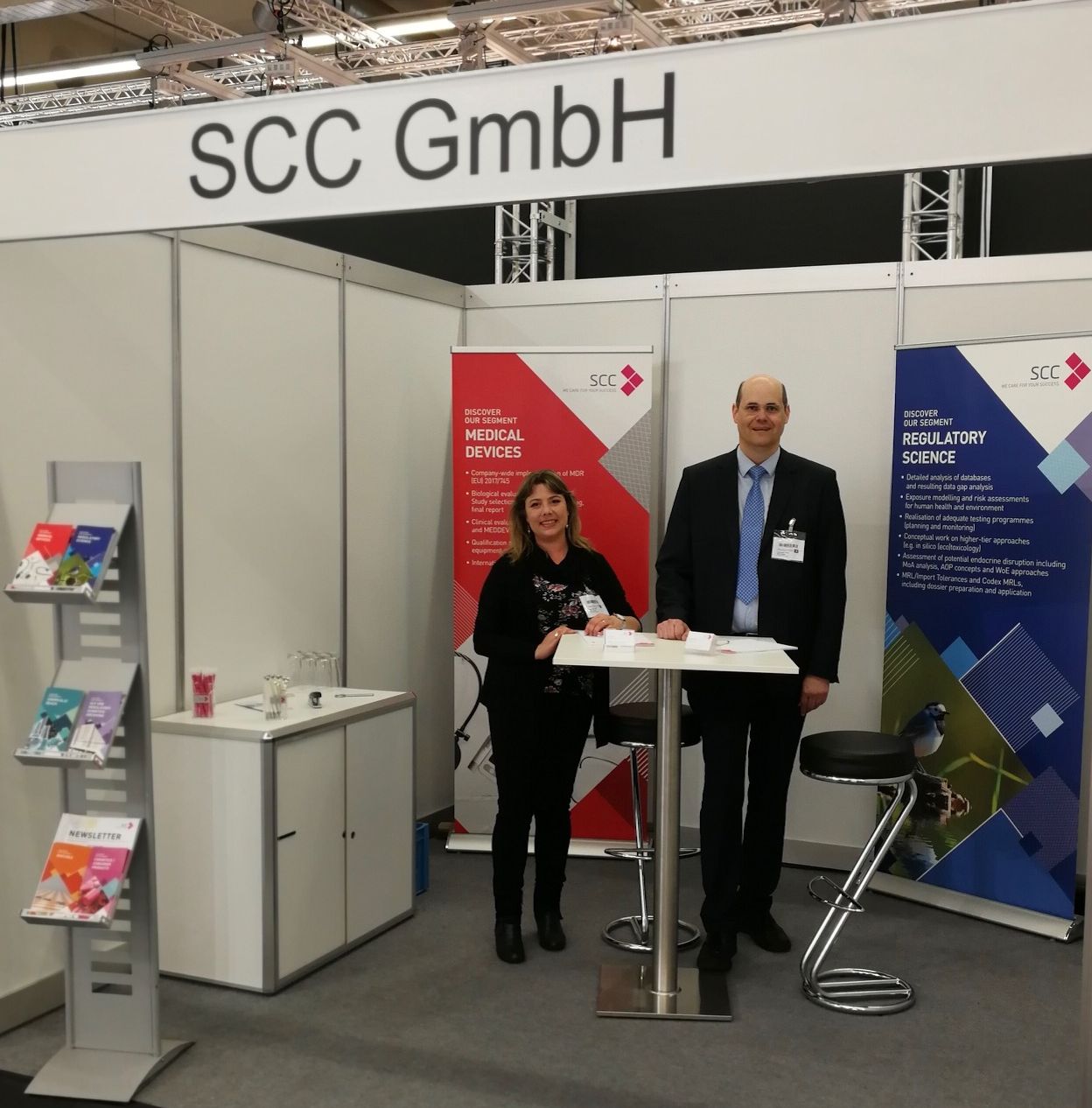
Drop by at SCC's Booth 222 / Hall 10.0
SCC is exhibiting at the premiere event MedtecLIVE 2019, taking place in Nuremberg from 21 – 23 Ma 2019. The MedtecLIVE is the new platform for international medical technology, which offers its visitors a wide range of products and service solutions, presenting latest scientific research results and most important innovations. MT-CONNECT and Medtec Europe have pooled their expertise to create a new trade fair with a distinct focus on the entire medical technology supply chain.
Join MedtecLIVE and meet SCC at Booth 222 / Hall 10.0 to learn how we can support your business on international markets for medical devices.T4M – Medical Technology Expo 2019
Date: 7 May 2019
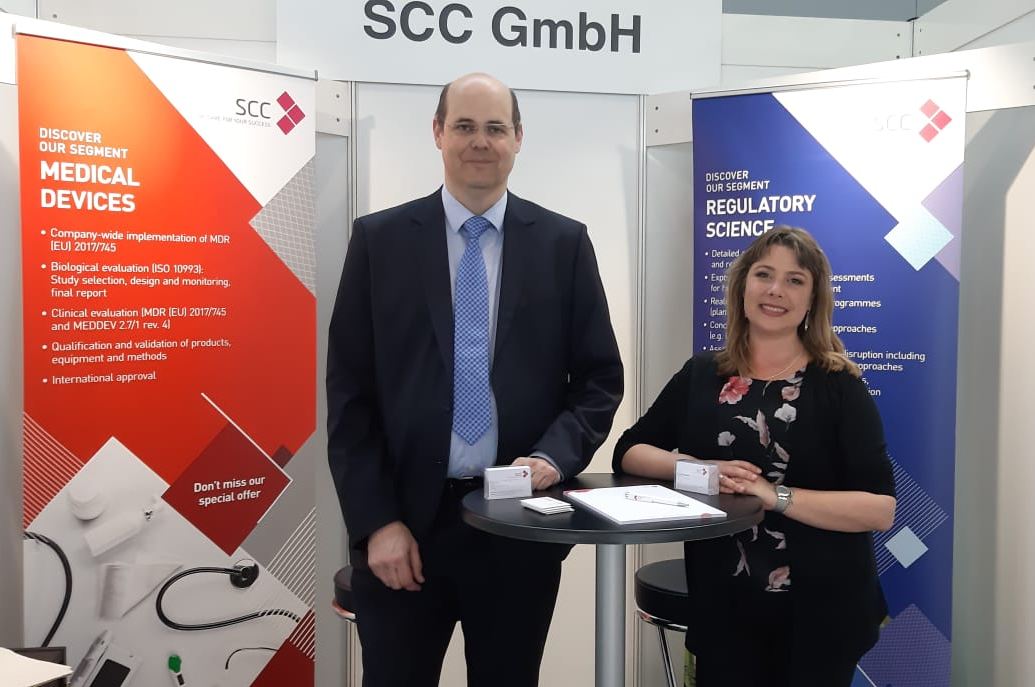 |
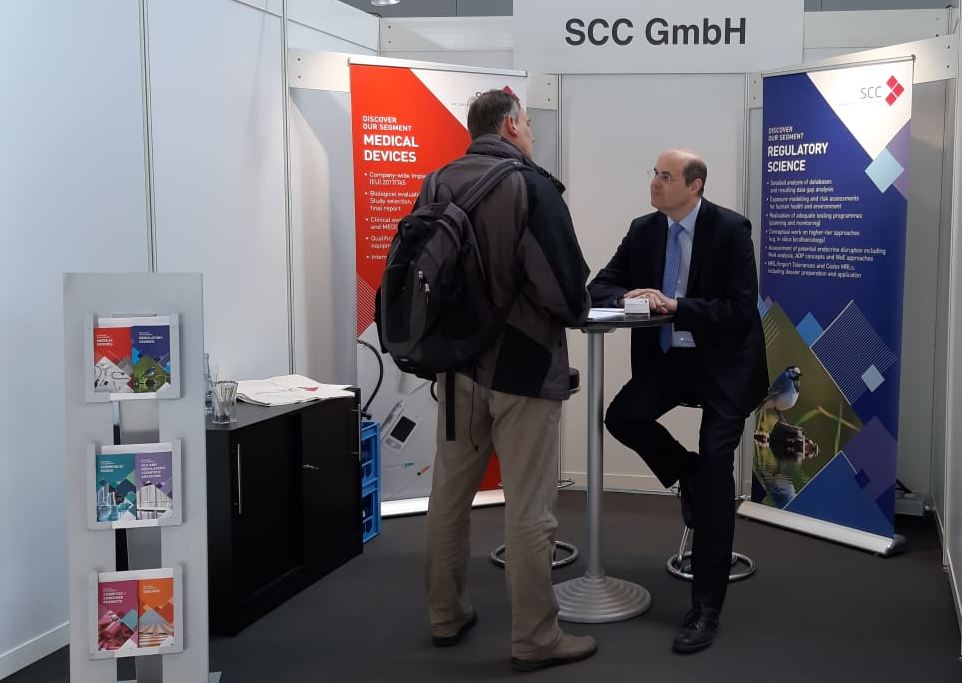 |
Drop by at SCC's Booth 21A/Hall 9
For the next three days, the T4M Expo has opened its doors at the Messe Stuttgart. Running alongside Control 2019, T4M is the new trade fair for manufacturers of medical devices with the focus on production technology, production environment, services, as well as components and materials.
Join SCC at T4M. Our colleagues on site are looking forward to meeting you at SCC booth 21A/Hall 9.
New SCC spin-off: SCC LEGAL Law Firm
Date: 6 May 2019

Dr Burkhard Funk, lawyer and head of SCC LEGAL
Over the last years, the complexity of regulatory requirements has been continuously increasing, with scientific and legal issues getting more and more interlocked and interdependent. With the intention to meet the upcoming challenges in the field of regulatory compliance, SCC LEGAL Law Firm has been recently founded as an independent spin-off of SCC. SCC LEGAL is managed by Dr. Burkhard Funk, attorney at law with more than a decade experience in various fields of corporate and chemical law. Both companies cooperate closely with the clear goal in mind to help navigate our customers through all stages of the regulatory process.
SCC LEGAL offers legal services in the following fields of expertise:
- Data Sharing Services
- Consortium / Task Force management
- Regulatory compliance advisory services in line with EU regulations of agrochemicals, biopesticides, chemicals and biocides
- Representation to authorities (EU and national)
- Legal actions against inactivity of the competent authorities
- Compliance audit
- Contract Law
ECHA recommends companies to transfer registrations before the UK's withdrawal
Date: 4 April 2019
ECHA continues to recommend companies to prepare for the UK's withdrawal without a transition period, now expected to take effect on 13 April 2019, at 00:00 hours CET (i.e. 12 April 2019, 11 p.m. UK time). For more information, view ECHA's news release.
RMS switch due to Brexit: A number of biocidal active substances have been assigned to new RMS
Date: 3 April 2019
Commission Delegated Regulation (EU) 2019/227, applying from 30 March 2019, amends Regulation (EU) No 1062/2014 as regards certain active substance/PT combinations for which UK was the designated evaluating competent authority (eCA). In its Annex, it provides a table (on active substance/PT combinations and respective Rapporteur Member States) which replaces Annex II to the Delegated Regulation (EU) No 1062/2014. It defines the new eCAs taking over the role of eCA from the UK.
Regulation (EU) 2019/227 also defines the time lines for the new eCAs to inform the participants of the fees payable under Article 80 (2) of Regulation (EU) 528/2012 (BPR) and to send the assessment report and conclusions.
Circular Economy - EU Parliament approves new fertiliser regulation
Date: 28 March 2019
Yesterday the European Parliament adopted the new regulation laying down rules on the making available on the market of EU fertilising products and amending Regulations 1069/2009 and No 1107/2009 and repealing the existing EU fertiliser Regulation 2003/2003 with 582 to 38 votes (7 abstentions).
The new Regulation is an integral part of EU's Circular Economy Package, establishing EU-wide quality, safety and environmental criteria for EU fertilisers whereat not only inorganic fertilisers will be covered by this Regulation, but also organic fertilisers, soil improvers, liming materials and growing media, inhibitors as well as biostimulants.
The new Regulation will apply three years after entry into force. Considering the procedure following-up the vote by Parliament, the new Regulation most likely will apply from 2022 onwards.
For more information on the Regulation, please refer to the various articles on fertilisers and biostimulants in SCC’s news archive 2018.
Dr Lars Huber, Head of Biorationals, Fertiliser, IPM
Impact of Brexit on parallel trade of plant protection products
Date: 8 March 2019
On 6 March 2019, the German Federal Office of Consumer Protection and Food Safety (BVL) published a note stating that, in the event of a no-deal Brexit, Germany would not recognise parallel trade permits issued for plant protection products, sourced in the UK, unless permits have been prolonged. The German position corresponds to the official statement of the European Commission. Click here to read the official BVL's note in German.
CAC 2019 – China’s International Agrochemical & Crop Protection Exhibition in Shanghai
Date: 5-7 March 2019
On 5 March the new Shanghai International Expo Center opened its doors to the CAC trade show, world largest one-stop platform for global agrochemical business performers.
Alongside the exhibition, CAC 2019 offers a wide-ranging conference programme providing updates on latest developments in the global pesticide & fertilizer industry, exploring newest trends in seed treatment & bio-control technologies as well as focusing on regulatory challenges faced by the global crop protection industry today.
Dr Hans-Josef Leusch, SCC’s senior regulatory expert and director of strategic business development, is attending CAC 2019 and speaking at the 2nd CROs & CRAOs Expertise Sharing Conference in Global Agrochemical Industry on Microbial Biocontrol Agents in the EU: regulations, procedures and chances.
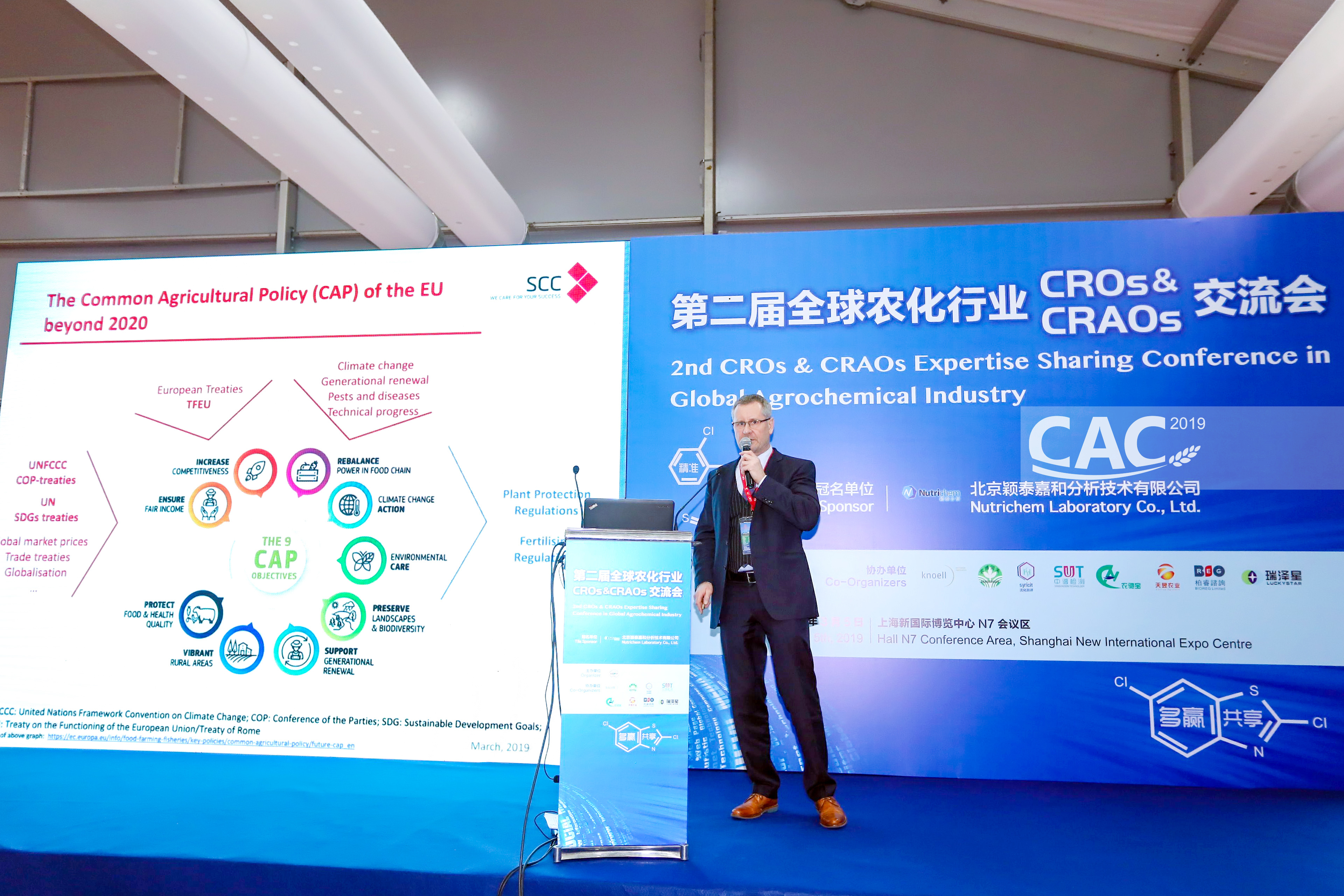
SCC's archives confirmed as GLP compliant
Date: 28 February 2019
SCC is proud to announce that its statement of GLP compliance was reissued.
As an independent test site in the national GLP Compliance Programme, we are inspected on a regular 3 year basis. Our contract archive was inspected on 24 October 2018 and the statement of GLP compliance according to the German Chemikaliengesetz, EU Directive 2004/9/EC and OECD Principles of GLP was issued on 18 February 2019 by the Landesamt für Umwelt, Mainz, Germany.
Registration of plant protection products – Germany pursues EU Commission’s policy on Brexit
Date: 27 February 2019
The German Federal Office of Consumer Protection and Food Safety (BVL) has officially confirmed that it is going to take the position of the European Commission on Brexit, intending to treat the United Kingdom as a “third country” after the withdrawal deadline. From that moment on, the Regulation 1107/2009 will consequently cease to apply for the UK.
Please read the full communication in German on the BVL’s website.
New Communication on RZMS and Brexit
Date: 26 February 2019
The interest group PPP Zonal has recently uploaded the following document on CIRCABC: Communication Central Zone on ZRMS and Brexit.pdf.
This document answers the question what happens when the UK is zRMS (Zonal Rapporteur Member State). Read the communication on the CIRCABC website.
HSE offers stakeholder events preparing for EU Exit in a no-deal scenario
Date: 18 February 2019
The Health and Safety Executive (HSE) is holding a series of one-day stakeholder events across the UK covering EU Exit and its impact on the chemicals regimes in a no-deal scenario. For more information, please check the HSE website.New Manufacturer Incident Report templates for medical devices available
Date: 13 February 2019
The European Commission has published a new Manufacturer Incident Report (MIR) template, which adopts the Medical Device Regulation MDR (EU) 2017/745. The new template replaces the form in MEDDEV 2.12/1 revision 8 annex 3 and has been restructured and extended in all sections.
Further to the reporting template, a detailed help text is provided, including the tables for the code selection as well as the .xsd files for implementation in the manufacturer’s databases before January 2020.
Click on the following links to download the files:
Recent guidance on the UK exiting the EU
Date: 7 February 2019
In preparation for the UK’s withdrawal from the EU, the British government organizes a one-day stakeholder event in Antrim, Northern Irland, on 26 February 2019. The event, presented by HSE (GB) and DEFRA, will cover the Brexit issue and its impact on chemical regimes in a no-deal scenario. Please click here, to view the details. Further to this, Cefic and Chemical Industries Association (CIA) issued a briefing note on Brexit: Preparing for a future “UK out of REACH scenario” on 28 January 2019.
ECHA is also planning to publish a communications package to provide guidance to businesses placing chemical substances on the EU market in preparation of Brexit. SCC will follow up on this.
UK releases further guidance on chemicals regulation in the event of a no-deal Brexit
Date: 23 January 2019
In light of recent events, the British government has published further guidance covering the legal requirements included in the Biocidal Products Regulation, Classification Labelling and Packaging and Prior Informed Consent regulations as retained in UK law, using powers in the EU Withdrawal Act 2018. To view the recent requirements in case of a no-deal Brexit, please download the following files:Guidance on Biocidal Products Regulation (BPR)
Guidance on Classification Labelling and Packaging (CLP)
Guidance on Prio Informed Consent Regulation (PIC)
SCC launches a new regulatory group – Medical Devices
Date: 23 January 2019
We are happy to announce that we have recently launched a new regulatory group within our Chemicals division to expand the range of our services to registration support for the medical devices industry.
The new group is headed by Dr Alexander Theis, a polymer chemist with a hands-on long-standing experience in the medical device industry.
Our services for medical devices currently include:
- Offering support in product development and in-market compliance
- Individual gap analysis in context of MDR (EU) 2017/745 requirements
- R&D support
- Providing guidance with regard to biological evaluation of medical devices in line with ISO 10993
- Literature search and supply service
- Clinical evaluation following Article 61 and Annex XIV MDR (EU) 2017/745 and MEDDEV 2.7/1 revision 4
- Qualification and validation of production and quality control equipment and methods
- Preparing Safety Data Sheets
Constantly keeping your REACH dossiers up-to-date: this is NOT a ‘nice-to-have legal option’
Date: 17 January 2019
Recent communication by the EU Commission, ECHA, the BfR, and also by Cefic all emphasized the high importance for systematic REACH dossier updating by the registrants.
We have summarized the most important facts for you in one file which you can download here.
Don't hesitate to This email address is being protected from spambots. You need JavaScript enabled to view it. learn more.
Implementing Regulation on registration updates
Date: 8 January 2019
In the course of the 28th Meeting of Competent Authorities for REACH and CLP (CARACAL) the European Commission published a document (CA/114/2018) regarding the scope of an Implementing Regulation on registration updates.
SCC has a lot of experience in preparing and updating REACH dossiers according to the current REACH requirements. In case you are planning to update your REACH dossiers we can provide you with support. Please get into contact with This email address is being protected from spambots. You need JavaScript enabled to view it..
SIEF / SIEF Agreements
Date: 7 January 2019
The EU Regulation on chemicals “REACH” (Regulation (EC) No. 1907/2006) stipulates that Substance Information Exchange Forums (SIEFs) had to be operational until 1 June 2018, the day after the last REACH registration deadline.
Nonetheless, the registrants of a substance are still bound by the obligation to submit the information on their substance jointly and as of 1 January 2019, co-registrants have to coordinate the reply to ECHA, and speak with one voice during the entire process if they receive an ECHA decision, due to testing proposal evaluation or incompleteness of their dossiers.
ECHA Accounts - new features
Date: 7 January 2019
ECHA has launched new services for users of ECHA accounts.
When you log into your ECHA account, you now have the possibility to link the substances that are important for you and your company directly to your ECHA account by selecting them from the "Search for chemicals" section.

